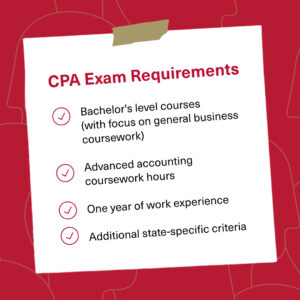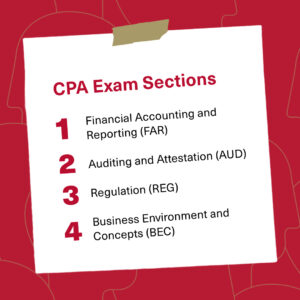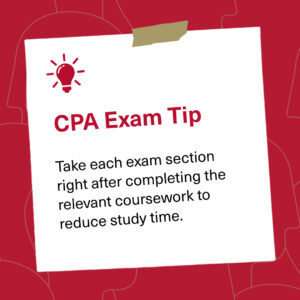Passing the Certified Public Accountant (CPA) exam is a common, early-career goal for professionals in the accounting field. While it’s not a requirement to work as an accountant, it’s frequently a prerequisite for hiring at major firms and to secure promotions.
The rigorous exam consists of four total sections, three of which cover knowledge of accounting, auditing and tax that every CPA is expected to know. For the fourth section, each candidate chooses a discipline in which to demonstrate a deeper understanding. Additionally, there are strict requirements you must complete before sitting for the exam and then receiving licensure.
Most students in the Master of Accountancy (MAcc) and STEM-designated Master of Science in Accounting, Technology and Analytics (MSATA) degrees at the Daniels College of Business enroll in those programs with the goal of becoming a CPA.
Sharon Lassar, director of the School of Accountancy at Daniels, said that preparation is the key for any student approaching the CPA exam. To facilitate that, the School of Accountancy at Daniels takes a hands-on approach with its students, ensuring they’re ready to pass the exam when the time comes.
“We work with each student to help them craft a degree plan to achieve whatever their overall career objective is,” Lassar said. “Generally, one of the objectives of our students is to also meet the requirements to become a CPA.”
Completing one of our degree programs may or may not qualify a candidate for CPA licensure in their intended jurisdiction of practice. Each jurisdiction has unique requirements. We help students interpret licensure rules and craft a plan to ultimately meet the requirements.
A Crucial Step for Career Advancement in Accounting
While you don’t need to pass the exam to work in the field of accounting, you do need it to receive the CPA title and designation.
Becoming a CPA can be a huge boost to your career, both in status and financial compensation. Lassar said the sooner you complete your exam, the more attractive you are to employers.
“It is very important for public accounting firms that the staff that they hire eventually become CPAs,” she said. “The School of Accountancy’s reputation of producing graduates that often pass the exam before they show up for work is very attractive to employers.”

Eligibility Requirements for the CPA Exam
In the journey to become a CPA, students must meet general academic, accounting and work experience requirements. Each jurisdiction sets its own requirements, but most require CPA candidates to earn a bachelor’s degree and complete an additional 30 semester credit hours. Within the number of courses completed, most states require CPA candidates to include a certain number of general business courses in addition to accounting courses. Some states have specific requirements regarding the content of some courses. Colorado has one set of education requirements candidates must satisfy before sitting to the exam and an expanded set of education rules before candidates can obtain the license. The rules can be complicated, and Daniels helps students navigate them.
Obtaining the necessary education and passing the exam are the first two steps towards licensure. The third step is to meet the experience requirement. All jurisdictions require CPA candidates to satisfy the “three Es” – education, exam and experience, but only the exam is uniform across all 50 states. The experience requirement is one-year for all jurisdictions, but the type of experience that counts might vary.
It’s important to check your state board of accountancy for their rules. Lassar said that once you’re licensed in one state, you generally have practice privileges in other states, but your employer will likely want you to be licensed in the state where you spend most of your time.
“We work with the students to point them to the rules for whichever jurisdiction they plan on moving to when they graduate, and we help them meet the rules to become a licensed CPA in that state,” she added.
 Understanding CPA Exam Sections
Understanding CPA Exam Sections
Like with many standardized tests, you can expect a variety of question-types on the CPA exam. There are multiple choice questions, task-based simulations that are similar to short-answer questions, and written communication tasks, or longer essays. There are between 50 and 82 multiple-choice questions across the four sections, with a varying number of short- and long-response questions.
The minimum passing score is 75 points, which doesn’t equate to 75%, as the weight of scores across the types of questions varies.
Within the exam, there are four sections. Those are:
- Financial Accounting and Reporting (FAR)
- Auditing and Attestation (AUD)
- Taxation and Regulation (REG)
- Discipline Section, where test takers choose one of the below sections:
- Business Analysis and Reporting
- Information Systems and Controls
- Taxation and Regulation
Each section measures a different knowledge area and tests students on a wide-ranging understanding of the accounting practice. At Daniels, coursework and instruction matches testing content. Lassar said some Daniels faculty will use the CPA review books as part of their teaching materials. Students are then encouraged to complete those sections of the exam once their class has completed.
The Role of Ethics Requirements in the CPA Exam and Beyond
In addition to technical knowledge, CPA exam test takers must be familiar with the ethical implications of the accounting field. Ethics requirements are integrated into the academic qualifications, as test takers are required to complete certain ethics-based business courses before sitting for the exam.
Additionally, in Colorado, exam takers must complete the AICPA Ethics Exam with a 90% or better score, within two years of the date of application for licensure.
Daniels is positioned well to prepare students for this part of the exam, as the College has long supported an ethics-based approach to business. Students at Daniels are prepared not only to do well in their career, but also to do good for their community.
 What It Takes to Pass the CPA Exam: Key Tips and Strategies
What It Takes to Pass the CPA Exam: Key Tips and Strategies
Preparation is key for the CPA exam, as the rigorous test covers all aspects of the field of accounting. There are a few ways you can enter the exam with a leg up.
Because the exam is broken down into four distinct sections, taking them immediately after completing relevant coursework can help cut down on study time. Mikey Gumataotao, a Daniels student completing a MAcc degree in the fall, has taken all four sections of the CPA exam during his time at the College. He stressed the importance of capitalizing on coursework and timing.
“When I took the audit exam, I just finished taking the audit in the classroom. So, I felt super prepared to take the exam,” Gumataotao said.
When it came to studying, Gumataotao followed traditional methods, including practice tests, but found that the Daniels coursework was his secret weapon.
“Daniels’ curriculum cut my study time by about one-third. I only had to study two-thirds of the recommended study time that a lot of the CPA exam review guides recommend [because of in-class preparation],” he said.
Embrace Flexibility in Your CPA Journey at Daniels
While the road to obtaining your CPA can seem challenging and strict, there’s more flexibility than you might realize. That’s a difference-maker at Daniels, Lassar said.
“The biggest advantage of our master’s programs in the School of Accountancy is the flexibility,” Lassar said. “Many schools are laser focused on just getting the student through a set curriculum and the students have no choices. Not only do our students have a lot of choices in what classes they take, but they could also step out for a quarter and come back. It’s not lock stepped. So, they have the ability to move at their own pace.”

